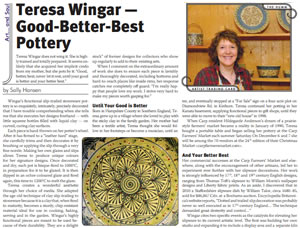Profiles of Local Businesses and Resources
In the spotlight
theHumm's cover story each month is always about a local artist. We also publish profiles of local farmers and food producers throughout the year.
On this page you'll find a summary of all profiles currently available on the website, including a few of other local businesses and resources that we've turned the spotlight on.
Don't forget to check out the photo galleries that go with many of these profiles.
Submit an idea
If you think there is a local artist, food producer or other resource that theHumm should be covering, give us a shout!

Community
Humm Contributors
Bill Buttle, ArtBeat Cartoonist
Dagne Forrest, Web Development
Earle Barber, IT & Database Development
Glenda Jones, Who is this Reever?
Rob Riendeau, Layout and Design
Local Artists
5iz Photography Collective Profile
Almonte Crazy Quilters Profile
Brent Kirkham Woodworker Profile
Dr. Shelley L. Ball - Photographer, Biologist, Environmental Educator
Elizabeth Veninga - Mixed Media Artist
Graham Ross - Illustrator, Graphic Designer
Jack Stekelenburg - Metal Sculptor
Jacquie Christiani - Watercolour Artist
Jeweller Profile Meredith Kucey
John Robert Bradley - Visual Artist & Instructor
Karen Phillips Curran - Watercolourist
Linda Hamilton - Visual Artist
Mary Jane Lancaster, Painter and Sculptor
Mary Lou Devine, Fabric Sculptor & Instructor
Mary Lynn Baker - Artist and Craftswoman
Mary Pfaff - Visual Artist, Teacher & Arts for Wellness Coach
Robert Pauly, Milliner, Jeweller, Art Quilts
Sally Hansen, Intrepid Arts Reporter & Nature Photographer
Sarah Moffat - Mixed Media Artist
Sherry White, Mixed Media Artist, Sculptor and Graphic Designer
Spartan Rubacha - Furniture Designer
Strachan Ley Johnston - Painter
The General - Exhibiting Artist Norman Takeuchi
Victoria Jenkins, Clay Sculptor & Potter
Local Food Producers
Bonita Ford and Sébastien Bacharach
Diana Beresford-Kroeger, Scientist & Author
Local Musicians
Brock Zeman, Singer Songwriter
Other Profiles
- Toonies for The Table Support Perth’s Good Food Bank
- Sharing the Local Love During the Holidays
- Holiday Magic Returns to Mississippi Mills
- The Magic Realismof Toller Cranston
- St. Paul’s Presents A Musical Celebration of Christmas
- Star So Bright
- The Father of the Christmas Bird Count
- A New Chapter for Jeff Banks of JB Arts
- Have Yourself a Merry Literary Christmas
- A Christmas Story: The Musical Riversong Players Bring Holiday Magic to Almonte in December!


